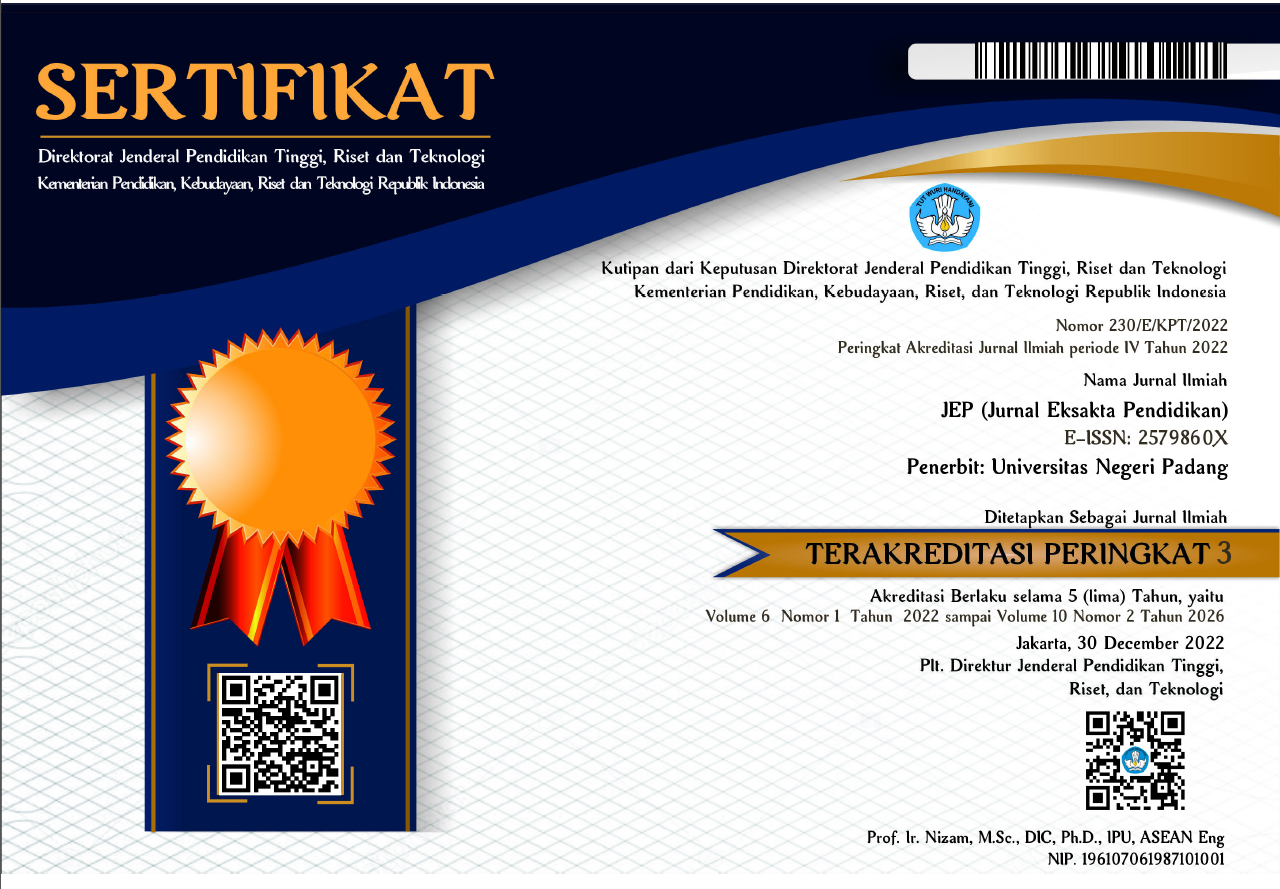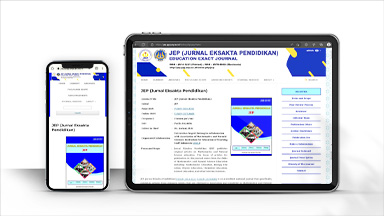Modul Berbasis Logika Pembuktian untuk Mengurangi Level Abstraksi Topik Grup dan Sifat-Sifatnya
Abstract
The most essential thing in mathematics is proof, it makes mathematics being different with other subjects. One of subject in mathematics that always need prove to understand the concept is abstract algebra. In studying abstract algebra, student need various abstract concepts to include in its concepts. It is hard for student to understand the structures in abstract algebra and prove some of mathematical object that satisfy the structures. Group and its properties is the first structure in abstract algebra that has an abstract concept. It is hard for student to understand some objects, that is proven satisfy a structure and why the proof steps just flow. By giving explanation and reason in every proofing step, we try to increase student proving level and reduce the abstraction level of the concepts. To see how this module reduces the abstraction level in teaching group, this module is applied to university students and evaluated by interviewing and questionnaires to the students. Base on student response and by some perspectives, student proving ability increase and the abstraction level of the concept is diminished in some aspects.
Downloads
References
Agustyaningrum, Nina, Riska Novia Sari, Agus Maman Abadi, and Ali Mahmudi. 2020. “Dominant Factors That Cause Students’ Difficulties in Learning Abstract Algebra: A Case Study at a University in Indonesia.†International Journal of Instruction 14(1). doi: 10.29333/IJI.2021.14151A.
Arnawa, I. Made, Y. Yerizon, and Sri Nita. 2019. “Improvement Students’ Level of Proof Ability in Abstract Algebra Trough APOS Theory Approach.†International Journal of Scientific and Technology Research 8(7).
Baylis, John, and Joseph A. Gallian. 1991. “Contemporary Abstract Algebra.†The Mathematical Gazette 75(473):374. doi: 10.2307/3619533.
Benkart, Georgia. 1987. “Abstract Algebra , By I. N. Herstein .†The American Mathematical Monthly. doi: 10.1080/00029890.1987.12000722.
Detlefsen, Michael. 2005. Proof, Logic and Formalization.
Dubinsky, Ed, Jennie Dautermann, Uri Leron, and Rina Zazkis. 1994. “On Learning Fundamental Concepts of Group Theory.†Educational Studies in Mathematics. doi: 10.1007/BF01273732.
Ducharme, Francine M. 2010. “Knowledge Translation Approaches to Implement Guidelines? Plan, Assess, Tailor, and Learn.†Allergy, Asthma & Clinical Immunology. doi: 10.1186/1710-1492-6-s4-a7.
Epp, Susanna S. 2003. “The Role of Logic in Teaching Proof.†American Mathematical Monthly. doi: 10.2307/3647960.
Ferrari, Pier Luigi. 2003. “Abstraction in Mathematics.†Philosophical Transactions of the Royal Society B:
Biological Sciences 358(1435):1225–30. doi: 10.1098/rstb.2003.1316.
Goodstein, R. L., and W. W. Sawyer. 1960. “A Concrete Approach to Abstract Algebra.†The Mathematical Gazette 44(348):138.
Haghani, Milad, Emiliano Cristiani, Nikolai W. F. Bode, Maik Boltes, and Alessandro Corbetta. 2019. “Panic, Irrationality, and Herding: Three Ambiguous Terms in Crowd Dynamics Research.†Journal of Advanced Transportation 2019. doi: 10.1155/2019/9267643.
Hart, E.: 1994, 'Analysis of the proof-writing performance of expert and novice students in elementary group theory', in E. Dubin-sky and J. Kaput (eds.), Research Issues in Mathematics Learning: Preliminary Anal-yses and Results. MAA Notes Series No. 33, Math. Assn. Amer,, 49-62.
Hazzan, Orit. 1999. “Reducing Abstraction Level When Learning Abstract Algebra Concepts.†Educational Studies in Mathematics 40(1). doi: 10.1023/A:1003780613628.
Hazzan, Orit. 2001. “Reducing Abstraction the Case of Constructing an Operation Table for a Group.†Journal of Mathematical Behavior 20(2). doi: 10.1016/S0732-3123(01)00067-0.
Judson, Thomas W. 2014. “Abstract Algebra Theory and Applications.†406.
Novotná, Jarmila, and Maureen Hoch. 2008. “How Structure Sense for Algebraic Expressions or Equations Is Related to Structure Sense for Abstract Algebra.†Mathematics Education Research Journal. doi: 10.1007/BF03217479.
Ohlsson, Stellan, and Erno Lehtinen. 1997. “Abstraction and the Acquisition of Complex Ideas.†International Journal of Educational Research 27(1):37–48. doi: 10.1016/S0883-0355(97)88442-X.
Syamsuri, Syamsuri, Purwanto Purwanto, Subanji Subanji, and Santi Irawati. 2017. “Using APOS Theory Framework: Why Did Students Unable To Construct a Formal Proof?†International Journal on Emerging Mathematics Education. doi: 10.12928/ijeme.v1i2.5659.
Ticknor, Cindy S. 2012. “Situated Learning in an Abstract Algebra Classroom.†Educational Studies in Mathematics 81(3). doi: 10.1007/s10649-012-9405-y.
Ünal, Menderes. 2017. “Preferences of Teaching Methods and Techniques in Mathematics with Reasons.†Universal Journal of Educational Research 5(2):194–202. doi: 10.13189/ujer.2017.050204.
Varankina, V. I., E. N. Lubyagina, R. V. Markov, A. A. Petrov, and D. V. Shirokov. 2019. “Computer Visualization in the Course ‘Abstract Algebra.’†Scientific Visualization 11(5). doi: 10.26583/sv.11.5.08.
Wadanambi, Gayanthi Malika, and Frederick K. S. Leung. 2019. “Exploring the Influence of Pre-Service Mathematics Teachers’ Professed Beliefs on Their Practices in the Sri Lankan Context.†LUMAT 7(2). doi: 10.31129/LUMAT.7.2.405.
Wasserman, Nicholas H. 2017. “Exploring How Understandings from Abstract Algebra Can Influence the Teaching of Structure in Early Algebra.†Mathematics Teacher Education and Development 19(2).
Widya, Ronal Rifandi, and Yosi Laila Rahmi. 2019. “STEM Education to Fulfil the 21st Century Demand: A Literature Review.†in Journal of Physics: Conference Series. Vol. 1317.
Copyright (c) 2021 Defri Ahmad, Fridgo Tasman, Ronal Rifandi, Saddam Al Aziz, Rara Shandy Winanda

This work is licensed under a Creative Commons Attribution 4.0 International License.

This work is licensed under a Creative Commons Attribution 4.0 International License.




_(2579-860X).png)
_(2614-1221)1.png)




